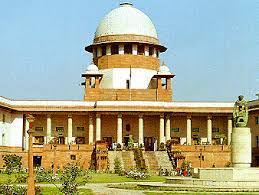A Division of the Bombay High Court stayed an order passed by a Civil Court in Bihar by entertaining a petition under Article 226 of the Constitution of India. (Para 2)
The first respondent proceeded against five properties mentioned in paragraph 1 of the impugned order. Orders were passed in favour of first respondent under Section 14 of the Securitization and Reconstruction of Financial Assets and Enforcement of Security Interest Act, 2002 (Para 5)
Trial Court purported to exercise the power under Rule 1 of Order XL of the Code of Civil Procedure, 1908 (for short “CPC”) by appointing the 7th respondent, who was a practising advocate as the Court Receiver for taking possession of the properties mentioned above. He was permitted to get help from the local police and take physical possession of the properties. (Para 6)
Thus, the appellant cannot plead ignorance about the knowledge of the pending proceedings initiated by the first respondent Bank. Notwithstanding the knowledge of the said proceedings, the appellant pressed for the appointment of Court Receiver and on 24th January, 2023 the Receiver was appointed with a direction to take possession of the aforesaid five properties. (Para 7)
We find that in the order of the Trial Court, the fact that the second respondent had mortgaged the said properties has been mentioned. The Trial Court ought not have passed a drastic order appointing Court Receiver without impleading the mortgagee as a party defendant. (Para 8)
Then comes the role played by the first respondent bank. The order passed by the Civil Court in Bihar was appealable under Order XLIII of the CPC. Instead of availing the remedy of the appeal, the first respondent took the extraordinary step of invoking the jurisdiction of the Bombay High Court under Article 226 of the Constitution of India by specifically challenging the order of appointment of the Receiver passed by the Civil Court in Bihar. (Para 9)
However, we also find that the appellant has indulged in the suppression of material facts while persuading the Trial Court to pass a drastic order for appointing a Court Receiver. There is another feature of the case. In the written statement filed by the defendants in the suit filed by the appellant, an issue of maintainability was raised. The order of the Trial Court noted that the first respondent had mortgaged the properties. The Trial Court did not pay attention to the issue of maintainability as well as the issue of territorial jurisdiction. An order appointing a Court Receiver has very drastic consequences. As noted earlier, such a drastic order was casually passed by the Civil Court. (Para 10)
SUPREME COURT OF INDIA
2023 STPL(Web) 357 SC
[2023 INSC 937]
Pankaj Kumar Tiwari Vs. Indian Overseas Bank Asset Recovery Management Branch & Ors.
Civil Appeal No. 6736 of 2023 (Arising out of S.L.P.(Civil) No. 22744 of 2023)-Decided on 13-10-2023
https://stpllaw.in/wp-content/uploads/2023/10/2023-STPLWeb-357-SC.pdf







